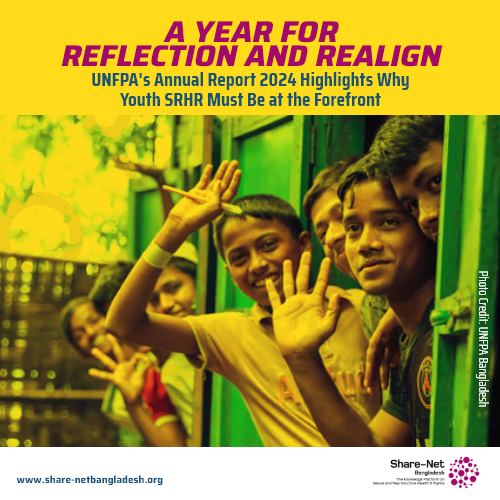A Year for Reflection and Realign: UNFPA’s Annual Report 2024 Highlights Why Youth SRHR Must Be at the Forefront
In a year shaped by crises and resilience, the UNFPA Annual Report 2024 sheds light on why investing in youth-centered Sexual and Reproductive Health and Rights (SRHR) is not just timely—but essential. With a population where over 30% are under 24, countries like Bangladesh must prioritise the needs, rights, and choices of young people.
The report calls 2024 “a year for positive reflection”, but not for complacency. It urges stakeholders to turn momentum into measurable progress—especially in ensuring access to sexual health services, education, and protection from gender-based violence. “The world cannot afford to leave young people behind,” the report stresses, citing alarming trends in early marriage, adolescent pregnancy, and unmet contraceptive needs.
Youth SRHR: The Urgency of Now
UNFPA flags that 1 in 4 girls in least-developed countries becomes a mother before age 18. In Bangladesh, 51% of girls are married before 18, according to UNICEF. The ripple effects are massive—school dropouts, lost job prospects, and heightened health risks for both mother and child.
The report documents how UNFPA supported youth empowerment programs in over 130 countries, from expanding Comprehensive Sexuality Education (CSE) to increasing youth-led policy advocacy. In Bangladesh, initiatives focused on equipping adolescents with knowledge and life skills, especially in urban slums and Rohingya refugee camps.
In 2024, UNFPA trained over 50,000 healthcare workers globally to provide youth-friendly services. Innovations included digital platforms offering confidential sexual health info and mobile clinics reaching underserved rural areas.
“We have a responsibility to support youth—not just to survive, but to thrive,” the report states. “They are not the leaders of tomorrow; they are the changemakers of today.”
Innovation, Inclusion, and Impact
The report highlights digital innovation as a gamechanger. In countries like Bangladesh, mobile-based apps and hotlines helped bridge the SRHR information gap during political unrest and climate emergencies. These tools ensured young people had access to accurate and stigma-free information, a lifeline in conservative contexts.
UNFPA’s global initiatives directly benefited over 1 million adolescents in 2024, many receiving SRHR education for the first time. Strategic partnerships with youth-led organisations also ensured accountability and inclusion.
Moving Forward: Policy to Practice
The report is a reminder that policy must translate into practice. It calls for integrating youth voices into national development, increased funding for adolescent SRHR, and stronger monitoring of early marriage prevention laws.
As Bangladesh navigates its demographic dividend, the report’s core message resonates: “Investing in youth SRHR is not optional—it is a prerequisite for sustainable development.”
Download UNFPA Annual Report 2024
Source: UNFPA




